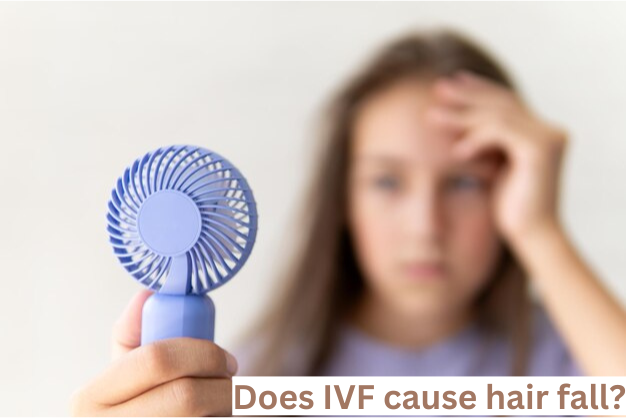Does IVF cause hair fall?
The journey to parenthood through In Vitro Fertilization (IVF) is a complex and emotionally charged one. While IVF offers hope to many, it's natural to have concerns about potential side effects. One common question that arises is, "Does IVF cause hair loss?"
We'll delve into the relationship between IVF and hair loss, providing you with accurate information and addressing potential concerns.
Hormonal Fluctuations and Hair Growth
One of the primary reasons why IVF might be linked to hair loss is the significant hormonal fluctuations that occur during the treatment process. These fluctuations can affect the hair growth cycle, potentially leading to temporary shedding.
Telogen Effluvium: This is a common type of hair loss that occurs when a large number of hair follicles enter the resting phase (telogen) prematurely. This can result in increased shedding a few months after a stressful event, such as IVF.
Anagen Effluvium: In rare cases, IVF medications can interfere with the growth phase (anagen) of hair follicles, leading to sudden and widespread hair loss.
Other Factors to Consider
While hormonal changes are a significant factor, it's important to note that other factors can also contribute to hair loss during or after IVF:
Stress: The emotional and physical stress associated with IVF can impact overall health, including hair health.
Nutritional Deficiencies: The rigorous IVF process can sometimes lead to nutritional deficiencies, which can affect hair growth.
Underlying Health Conditions: Pre-existing health conditions or medications can also influence hair loss.
Managing Hair Loss During and After IVF
If you're concerned about hair loss during or after IVF, here are some tips to help manage the situation:
Consult with a Healthcare Professional: Discuss your concerns with your fertility specialist or a dermatologist. They can assess your individual situation and provide appropriate guidance.
Maintain a Healthy Lifestyle: A balanced diet, regular exercise, and adequate sleep can help support overall health and hair growth.
Minimize Stress: Practice stress-reduction techniques like meditation, yoga, or deep breathing.
Consider Hair Supplements: While consulting with a healthcare professional, you may explore hair supplements that can help nourish your hair follicles.
The Importance of Patient-Centered Care
At New World Fertility Centre, we understand that the emotional well-being of our patients is just as important as their physical health. Our team of experienced fertility specialists and support staff is dedicated to providing personalized care and addressing your concerns throughout the IVF process.
If you have questions about hair loss or any other aspect of IVF, please don't hesitate to contact us. We're here to support you on your journey to parenthood.
Conclusion
While IVF can be a challenging process, the potential for hair loss is often temporary and can be managed effectively. By understanding the factors involved and taking proactive steps, you can minimize the impact of hair loss and focus on the exciting journey ahead.
Remember, your well-being is our priority. At New World Fertility Centre, we're committed to helping you achieve your dream of having a family.
FAQs
1. Can IVF treatments lead to hair loss?
Yes, IVF treatments can sometimes lead to temporary hair loss. This is due to hormonal fluctuations caused by fertility medications, stress, and changes in estrogen levels, which can affect the hair growth cycle.
2. Why do hormones during IVF cause hair fall?
During IVF, medications stimulate egg production by altering hormone levels, especially estrogen. These hormonal changes can disrupt the natural hair growth cycle, leading to more hair follicles entering the shedding (telogen) phase.
3. Is hair loss during IVF permanent?
No, hair loss during IVF is typically temporary. Once hormone levels stabilize after the treatment cycle, most women notice their hair regrowing within a few months.
4. What is telogen effluvium, and how is it related to IVF?
Telogen effluvium is a condition where more hair follicles than usual enter the resting (telogen) phase, causing excessive shedding. It can be triggered by stress or hormonal changes during IVF treatment.
5. How can I manage hair loss during IVF?
- Maintain a balanced diet rich in vitamins like biotin, zinc, and iron.
- Use gentle, sulfate-free hair care products.
- Avoid excessive heat styling and tight hairstyles.
- Manage stress through relaxation techniques such as yoga or meditation.

 Oct-09-2024
Oct-09-2024